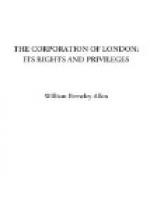to honour the brave and good, or to greet one another
in the loving cup. Unlike the coldly intellectual
reformers and theorists of the present day, they did
not consider the gaol and the workhouse as the only
asylums for poverty. They were men of feeling
and kindly impulse, not of abstract principles.
They gave their cheerful alms to the mendicants, and
spread a bounteous board for their neighbours.
Fools that they were! How is it that they did
not recognize the mendicant to be an impostor and
a drone, or bethink them that the money with which
they feasted their neighbour might have purchased
a field? It was because they were warm-hearted,
warm-blooded men, and not mere calculating machines.
They were glorious creatures, with thews and sinews,
and they made their country great and powerful among
the nations of the world; but they never paused to
denounce the cost of a dinner, or to grudge a flowing
bowl to their kinsfolk and neighbours. Besides,
our Pharisees of reform conveniently forget that the
copious banquets at which they turn up their envious
eyes are mostly defrayed from private funds.
The sheriffs, for instance, derive no aid from public
moneys; their own fortunes provide the means for handsomely
entertaining friends and strangers, and for dispensing
open-handed charity. The Lord Mayor himself
almost invariably draws upon his own resources to a
large amount, in order to maintain the ancient reputation
and actual present influence of the City of London.
Demolish Gog and Magog, put down the civic banquets,
break up and melt down the weighty and many-linked
chains of solid gold round the neck of my lord mayor
and the sheriffs, strip off the aldermen’s gowns,
make a bonfire of the gilded carriages, wring, if
you will, the necks of both swans and cygnets.
It is all vanity and vexation. Man is an intellectual
animal: he wants none of these gewgaws.
Alas! Wisdom may cry aloud in the streets, but
no one will heed her words if she speaks beyond his
comprehension. In theory, these Pecksniffs of
retrenchment might possibly be correct if mankind
had attained the same degree of marble indifference
with themselves. In the mean time, while we
are honest and true, it is good to be merry and wise.
Passing lightly over the intervening reigns, we now
arrive at that of James I., who granted three very
valuable charters to the Corporation of London.
The first alludes to the immemorial right of the mayor
and commonalty to the conservancy of the Thames, and
to the metage of all coals, grain, salt, fruit, vegetables,
and other merchandise sold by measure, delivered at
the port of London. Of the exact nature of these
privileges and of their beneficial operation, so far
as public interests are concerned, we shall have occasion
to speak hereafter, merely premising in this place
that they have been enjoyed “from time whereof
the memory of man runneth not to the contrary.”
The second charter, after confirming former liberties,
enlarges the limits of the civic jurisdiction and
ordains that the mayor, recorder, and two aldermen,
shall be justices of oyer and terminer. The third
one is simply an amplification of the preceding two,
and clears up various doubts as to the weighing and
measuring of coals: both offices are granted
or confirmed.




